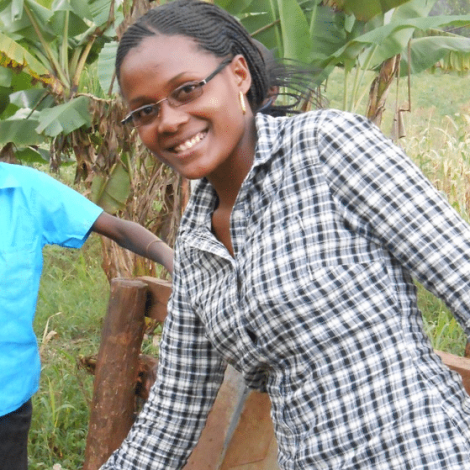There might be a simple way to repair broken water pumps and dilapidated infrastructure in Uganda, Diana Keesiga says. Install water meters. The lowly water meter allows companies to charge for use and earn money to invest in the wells, pumps and pipes. To help spread the gospel of the meter, Keesiga took a position as Water and Sanitation Engineer with the non-profit organization Water For People. She is a native of the country, from a village called Kifunjo in western Uganda. She graduated from Makerere University in Kampala with a degree in civil engineering. And, she says, she owes her success in life so far to God and her family. We asked her five questions.
E4C: What is one of the promising trends that you see in water improvement work in Uganda or elsewhere in the world?
DK: One of the most promising trends is what we are promoting in Uganda, a “pay-as-you-fetch” model that requires water users to pay for the water they use. The fees collected are used to sufficiently maintain the water point forever. As such, they never need intervention from any other agency. That reduces and eventually eliminates wasted investments for the many NGOs in the water and sanitation sector.
E4C: What do you think is a dead end in your field that some people just won’t let die?
DK: Provision of free services, mainly from NGOs to communities under the notion of “people are too poor to buy water!” Yet, they always have two dollars or more for making phone calls in a month. It should be about helping one realize what is more important, safe water or phone credits?
E4C: What are some of the tools that you use in your work that you think other people in your field would benefit from using?
DK: FLOW (monitoring tool) abbreviation for Field Level Operations Watch and the “At What Cost” model, a new WASH [WAter, Sanitation and Hygiene] financial planning tool developed by Water for People. It’s is an Excel-based tool by which the life cycle costs of a water system are calculated based on technology, hardware costs and inflation assumptions, thus facilitating the determination of an appropriate tariff rate.
Whereas women are fighting for equal rights and opportunities elsewhere in the world, where I am based even the fighting is still a pipe dream.
E4C: Have you encountered any challenges as a woman in engineering in the region where you work?
DK: Whereas women are fighting for equal rights and equitable opportunities, in some areas like where I am currently based, even the fighting is still a pipe dream. On more than one occasion, addressing locals starts out with a bit of difficulty. Old men give you a look that says you can’y say anything they haven’t heard before. A minute or less into the talking, the men become attentive and eagerly listen to whatever it is I am saying. Initially, it’s difficult, very difficult especially when people don’t really know one’s capabilities. But as all these begin to be manifested then the respect for one naturally grows and NEVER DIES! It’s a very interesting field, opens you up to different aspects of life and gives you strong character! One only has to be strong, focused and ready to embrace any circumstances. Nothing to be afraid of. If there is, then the men shall tremble too!
E4C: Story time: Would you describe a time when you just knew that you are in the right line of work?
DK: During University, my supervisor would always tell me how I should specialize in Water Engineering after school but deep down I had it for geotechnical engineering. I only had the chance to apply for one job and go for one interview of the job I am currently holding. Water and Sanitation? I really never saw this coming. First assignment: “ fix a water meter on a hand-pump”. No one is there to tell you do it this way, don’t do that, etc. I was told to be innovative. To try it out and see if works, and if it doesn’t, modify and try again. Right there and then I knew this was the place for me. Having no predefined methodology of doing something makes me sleep and wake up thinking about the “HOW.” This is the most interesting part about my job.

